Our Library
Explore our publications, from research papers and series to educational materials, covering all aspects of conflict transformation and peace promotion.
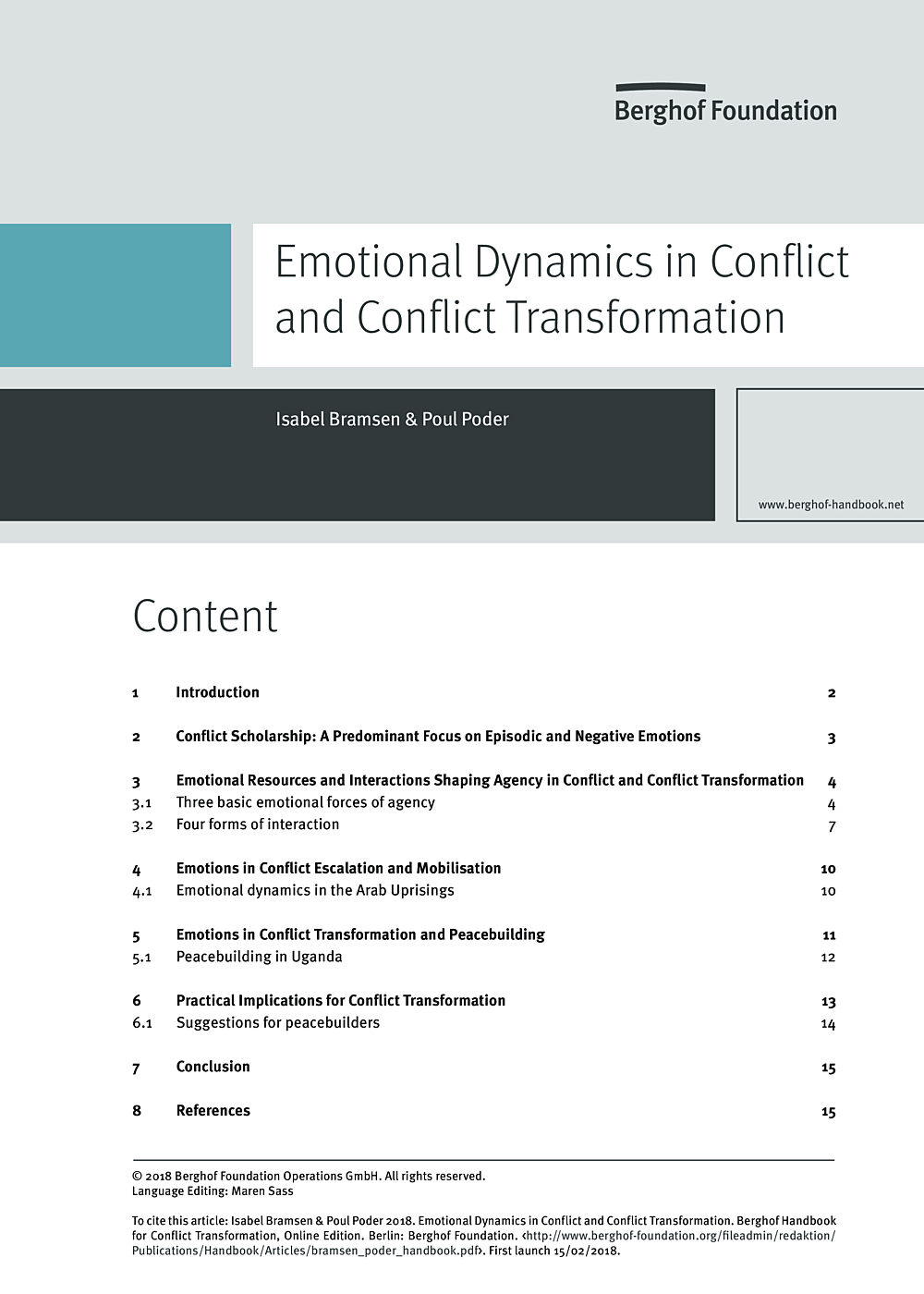
Emotional Dynamics in Conflict and Conflict TransformationHandbook Article
This article explores how emotions significantly arise in and through situational interactions, which either contribute to or weaken parties’ agency. Four forms of interaction are suggested that shape emotional dynamics in conflict and conflict transformation: (1) cooperative interaction, which leads to positive emotional energy (EE) such as confidence and trust that promote action, (2) dominating interaction, in which the dominating party gains more positive EE than the dominated party, (3) conflictual interaction, which generates negative EE that drives conflictual action, and (4) disengaged interaction, which causes loss of focus, boredom, indifference and fatigue.
- Year2018
- Author(s)Isabel Bramsen, Poul Poder
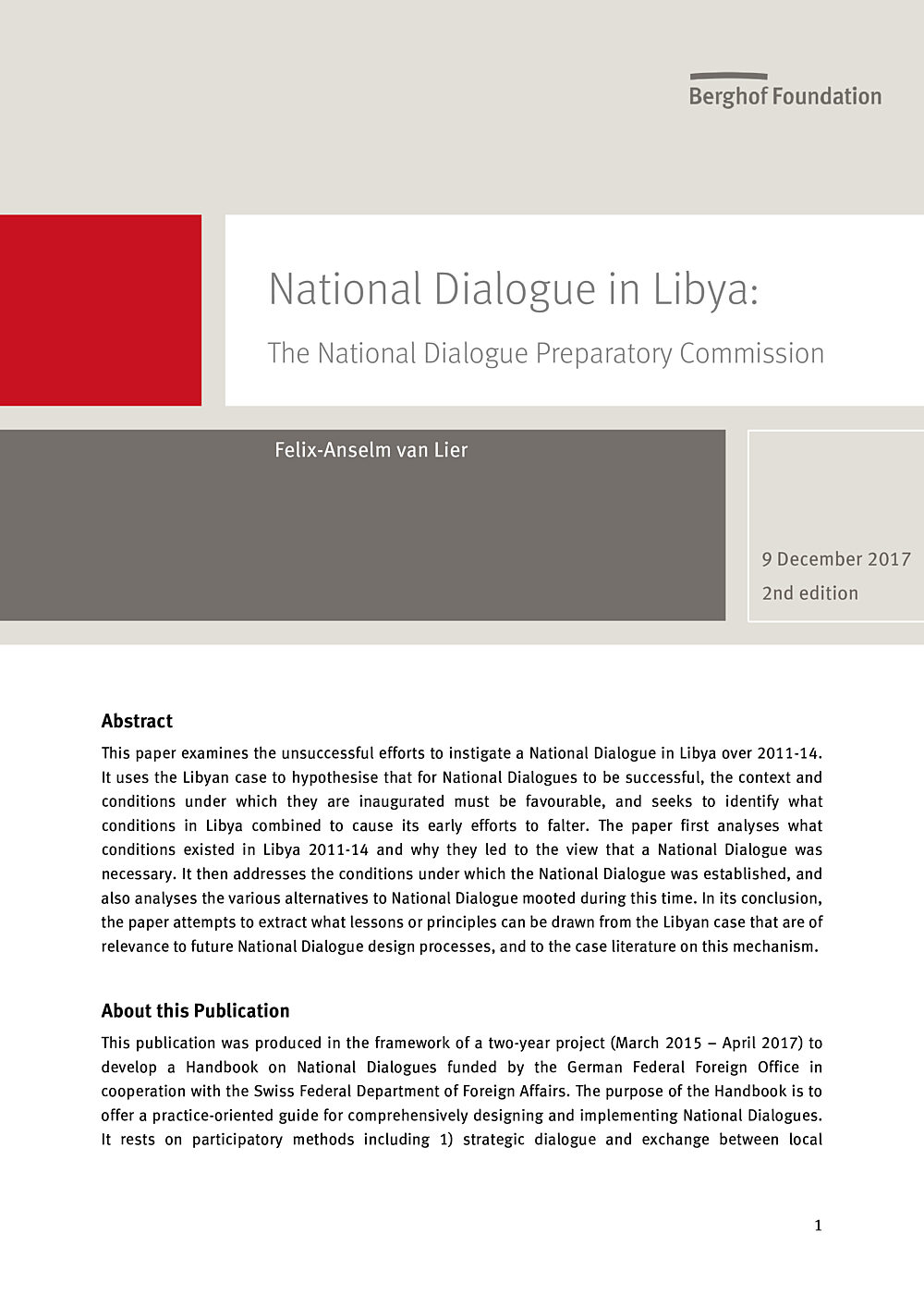
National Dialogue in Libya: The National Dialogue Preparatory CommissionNational Dialogue Handbook: Case Studies
This paper examines the unsuccessful efforts to instigate a National Dialogue in Libya over 2011-14. It uses the Libyan case to hypothesise that for National Dialogues to be successful, the context and conditions under which they are inaugurated must be favourable, and seeks to identify what conditions in Libya combined to cause its early efforts to falter. The paper first analyses what conditions existed in Libya 2011-14 and why they led to the view that a National Dialogue was necessary. It then addresses the conditions under which the National Dialogue was established, and also analyses the various alternatives to National Dialogue mooted during this time. In its conclusion, the paper attempts to extract what lessons or principles can be drawn from the Libyan case that are of relevance to future National Dialogue design processes, and to the case literature on this mechanism.
- Year2018
- Author(s)Felix-Anselm van Lier
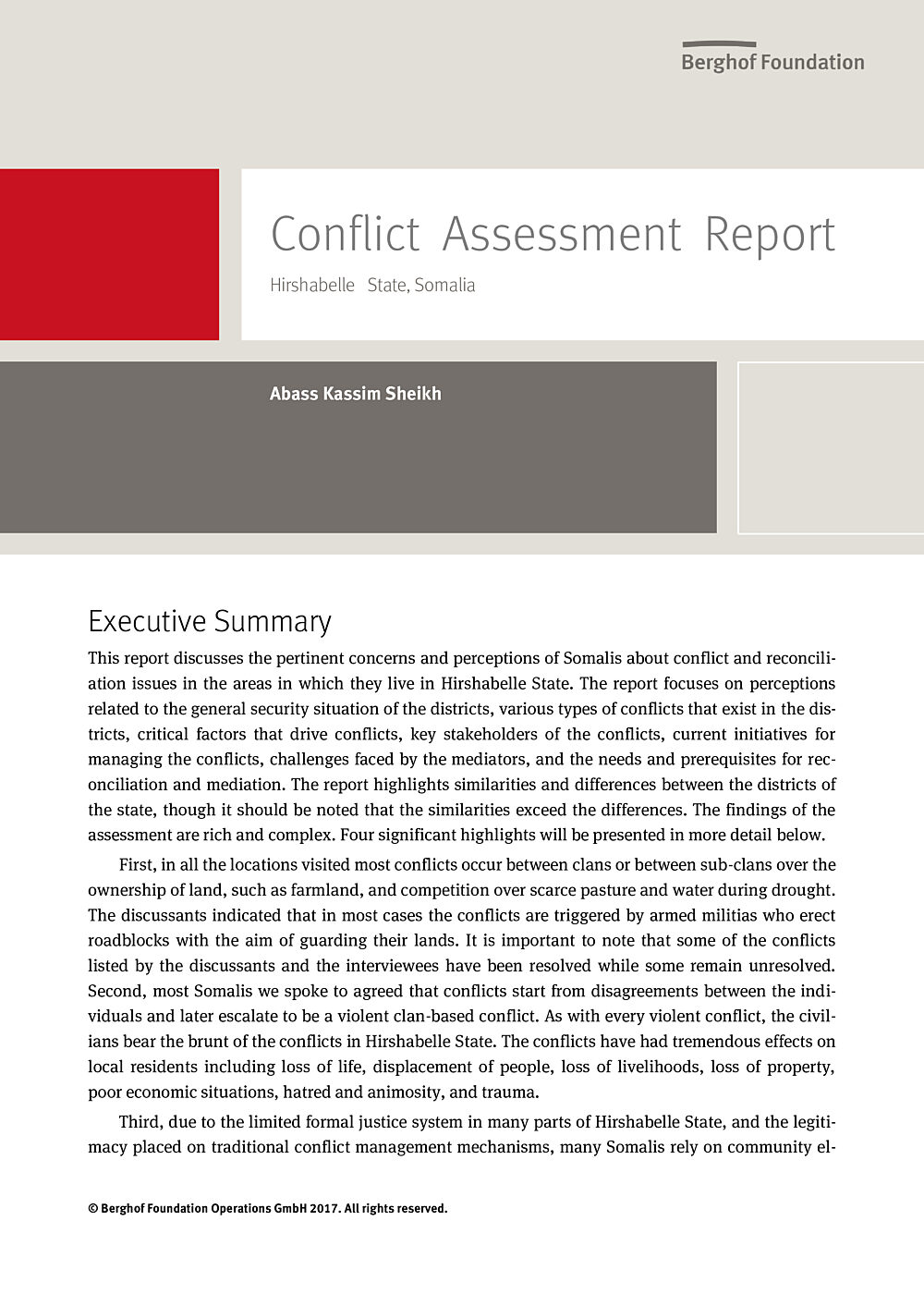
Conflict Assessment ReportHirshabelle State, Somalia
This report discusses the pertinent concerns and perceptions of Somalis about conflict and reconciliation issues in the areas in which they live in Hirshabelle State. The report focuses on perceptions related to the general security situation of the districts, various types of conflicts that exist in the districts, critical factors that drive conflicts, key stakeholders of the conflicts, current initiatives for managing the conflicts, challenges faced by the mediators, and the needs and prerequisites for reconciliation and mediation. The report highlights similarities and differences between the districts of the state, though it should be noted that the similarities exceed the differences. The findings of the assessment are rich and complex. Four significant highlights will be presented in more detail.
- Year2018
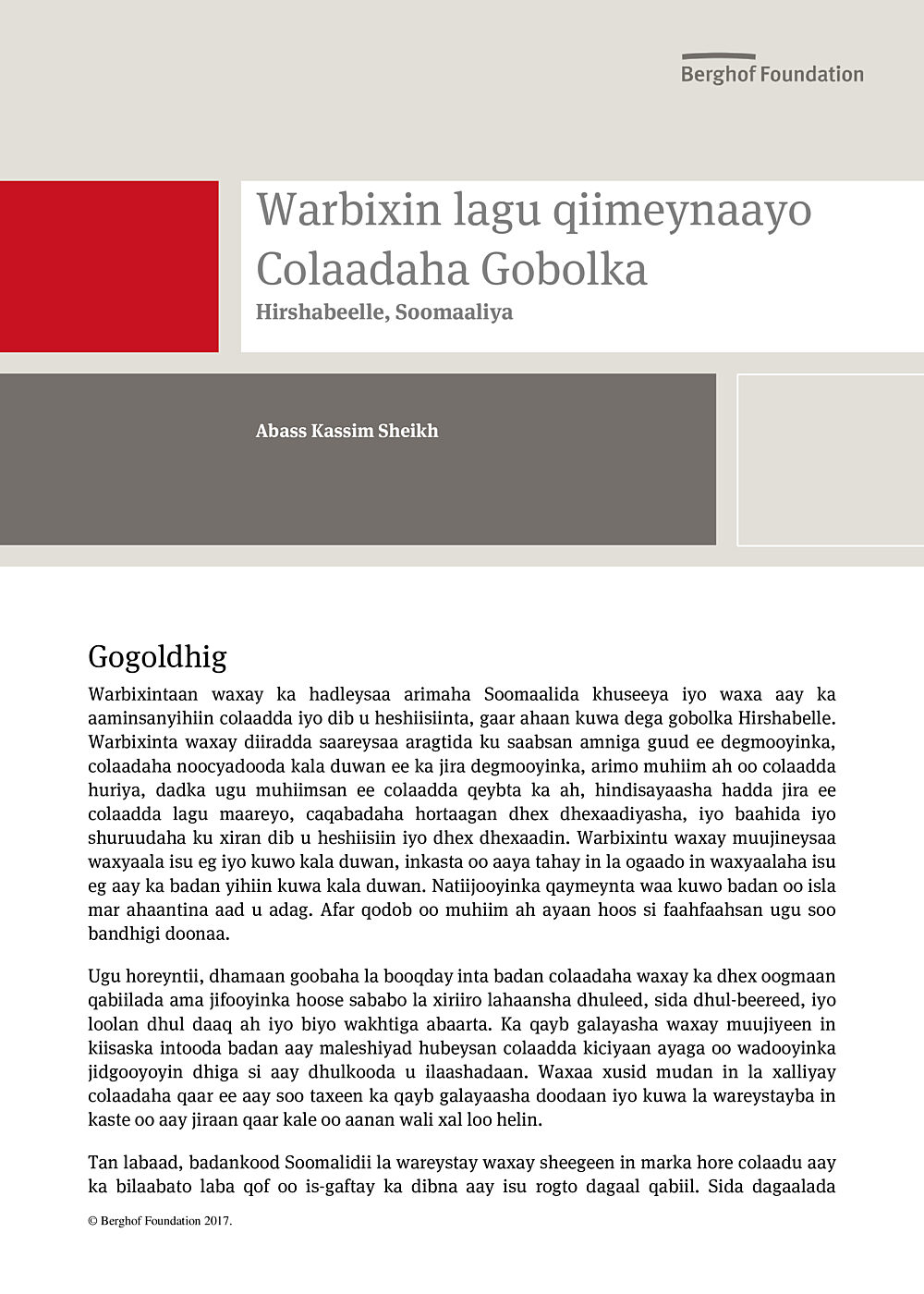
Warbixin lagu qiimeynaayo Colaadaha GobolkaHirshabeelle, Soomaaliya
Warbixintaan waxay ka hadleysaa arimaha Soomaalida khuseeya iyo waxa aay ka aaminsanyihiin colaadda iyo dib u heshiisiinta, gaar ahaan kuwa dega gobolka Hirshabelle. Warbixinta waxay diiradda saareysaa aragtida ku saabsan amniga guud ee degmooyinka, colaad aha noocyadooda kala duwan ee ka jira degmooyinka, arimo muhiim ah oo colaadda huriya, dadka ugu muhiimsan ee colaadda qeybta ka ah, hindisayaasha hadda jira ee colaadda lagu maareyo, caqabadaha hortaagan dhex dhexaadiyasha, iyo baahida iyo shuruudaha ku x iran dib u heshiisiin iyo dhex dhexaadin.
- Year2018
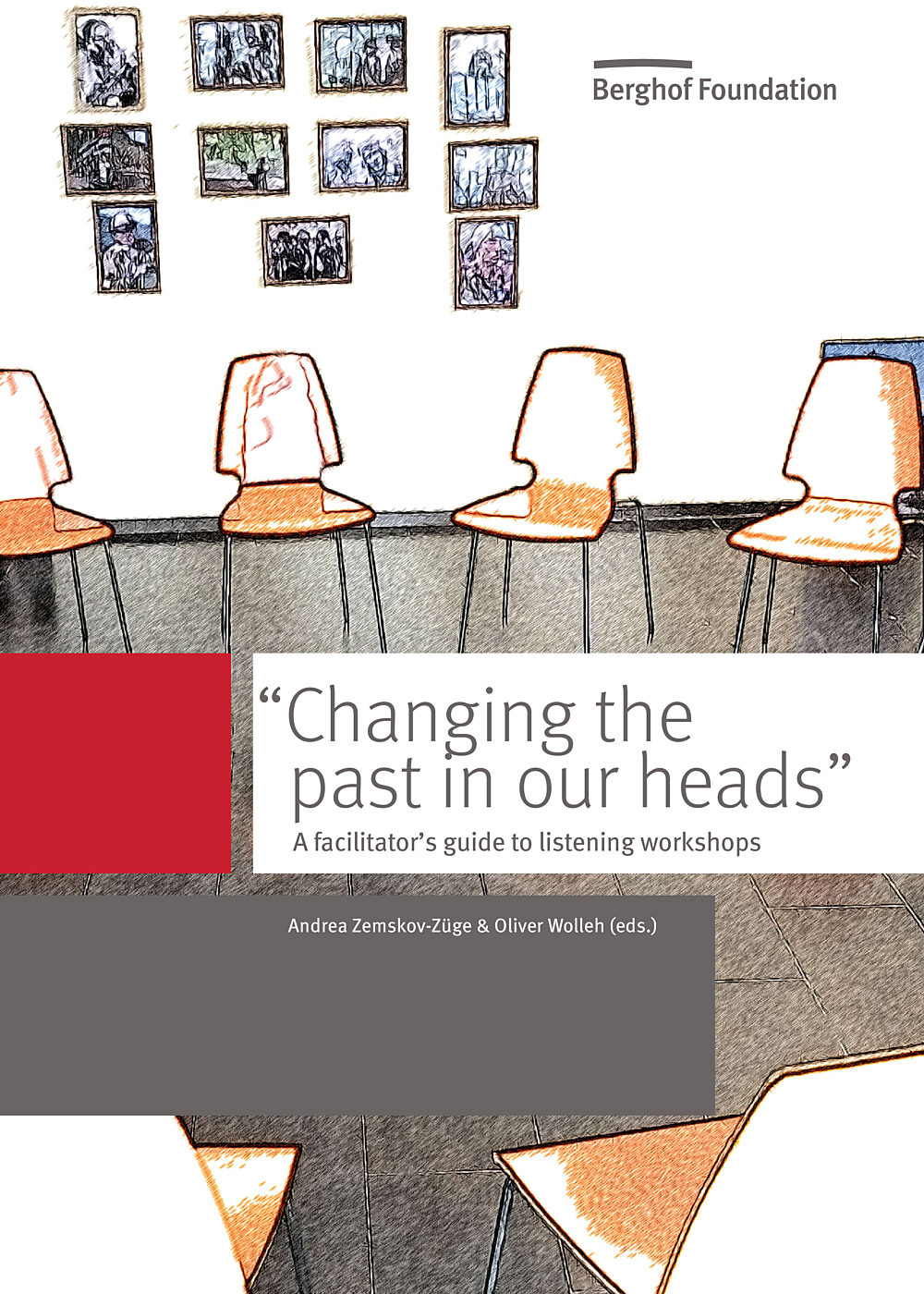
Changing the past in our headsA facilitator's guide to listening workshops
The history of this manual goes back to November 2012, when the Berghof Foundation’s Caucasus Programme gathered young people from Georgia, Abkhazia and South Ossetia to learn how to record biographical interviews and discuss questions of history, memory and conflict. This was the starting point of a process involving Georgian, Abkhaz and South Ossetian stakeholders of war-memorialization: the “Berghof History Dialogue Process”.
- Year2018
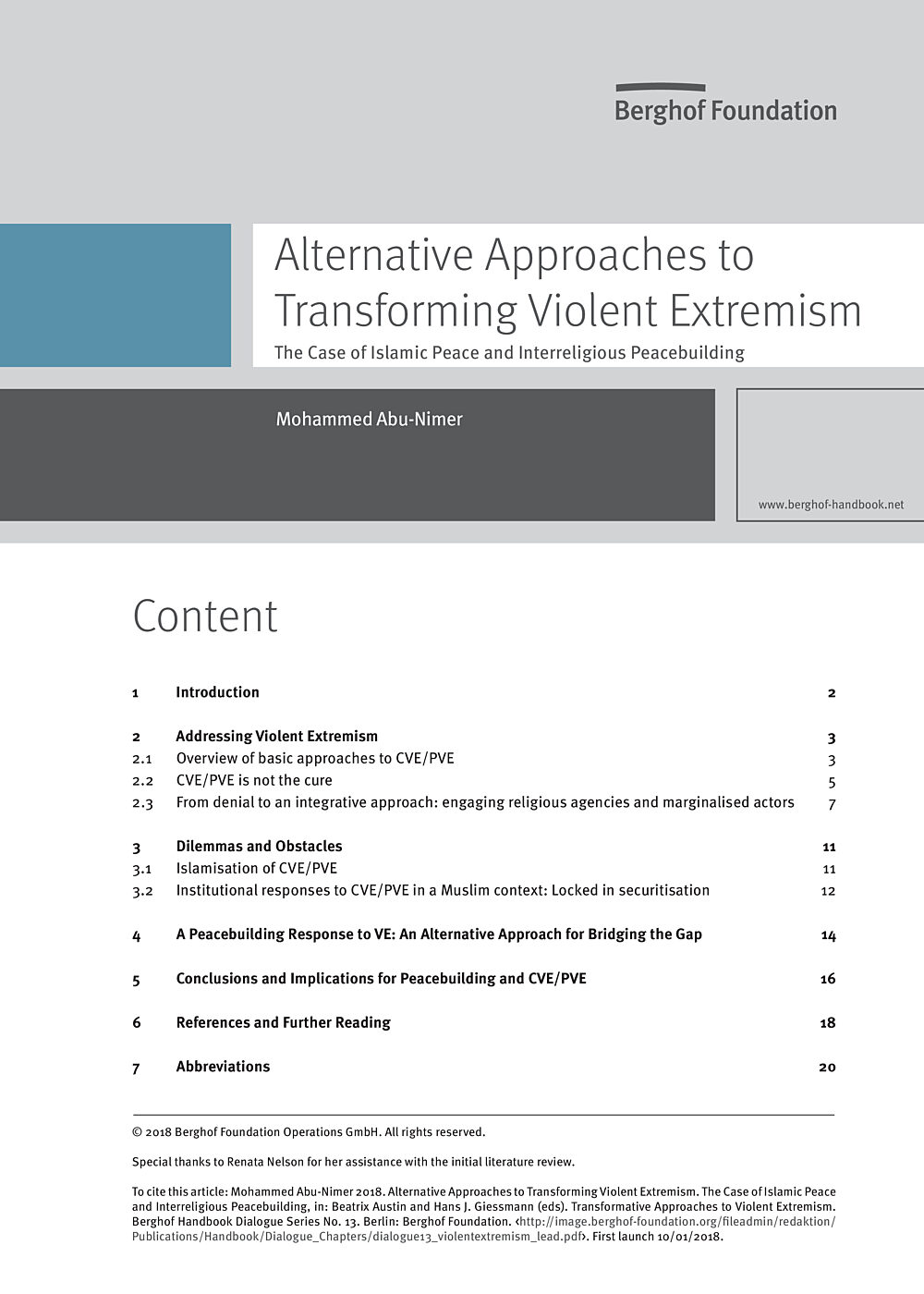
Alternative Approaches to Transforming Violent Extremism. The Case of Islamic Peace and Interreligious PeacebuildingBerghof Handbook Dialogue Series No. 13 - lead
This article critically examines the emerging CVE/PVE field and explores an alternative approach to address two core questions: how do various CVE/PVE approaches relate to current issues of violent extremism (VE) in Muslim communities, and what are the areas of intersection between interreligious peacebuilding and the various CVE/PVE approaches? In exploring the responses to these two dimensions, it is essential to analyse the assumptions and functions that CVE/PVE fulfil in the current crisis that faces many Muslim and non-Muslim governments around the world, especially in Europe and North America. Since “countering Islamic” terrorism and VE (based on the misperception and assumption that Muslims are disproportionately responsible for acts of violence) constitute the core of CVE/PVE approaches, it is necessary to explore whether this is the most effective method in confronting “Islamic threats”.
- Year2018
- Author(s)Mohammed Abu-Nimer
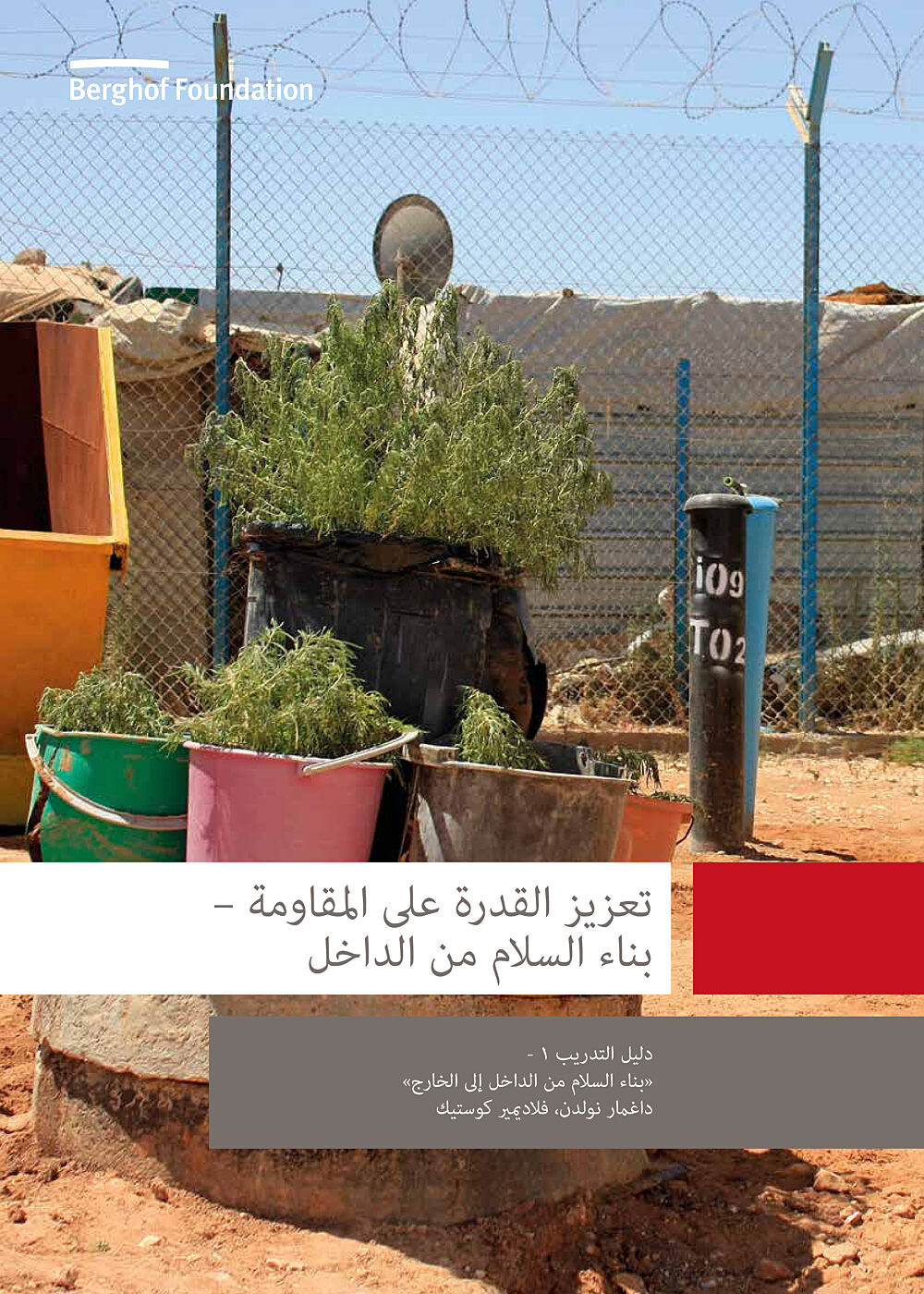
تعزيز القدرة عىل املقاومة – بناء السالم من الداخلدليل التدريب 1- بناء السالم من الداخل إىل الخارج
باإلضافة إىل ذلك، فإن مراعاة ظروف النزاع يف هذا السياق تعني، عىل سبيل املثال، تشجيع فهم النزاع كفرصة للتغيريوالتطوير، وانعكاس املواقف الشخصية وسلوكيات النزاع، مبا يف ذلك القواعد والقيم األساسية. عالوة عىل ذلك، فإنهيشمل زيادة الوعي باالحتياجات والرغبات واألهداف الشخصية، وأيضا اكتشاف الحدود الشخصية. وأخريا، فاحرتاممبادئ مراعاة ظروف الصدمة، وهو مقاربة أساسية لتعزيز التفاعل البناّء بني األشخاص )انظر GIZ 2017 )هو أيضاجانب ال غنى عنه من جوانب مراعاة ظروف النزاع.ا أساسيا من مقاربة الدورة التأهيلية، وبالتايل من الدليل املوجود يف متناول اليد.جميع هذه الجوانب تعترب جزءتتكون الدورة التأهيلية ذاتها من ثالث وحدات، وحدة حول الرتبية عىل السالم ووحدة حول املقاومة ووحدة حولاملرسح التفاعيل، ويركز هذا الدليل عىل وحدة تعزيز القدرة عىل املقاومة فقط.
- Year2017
- Author(s)Dagmar Nolden, Vladimir Kostić
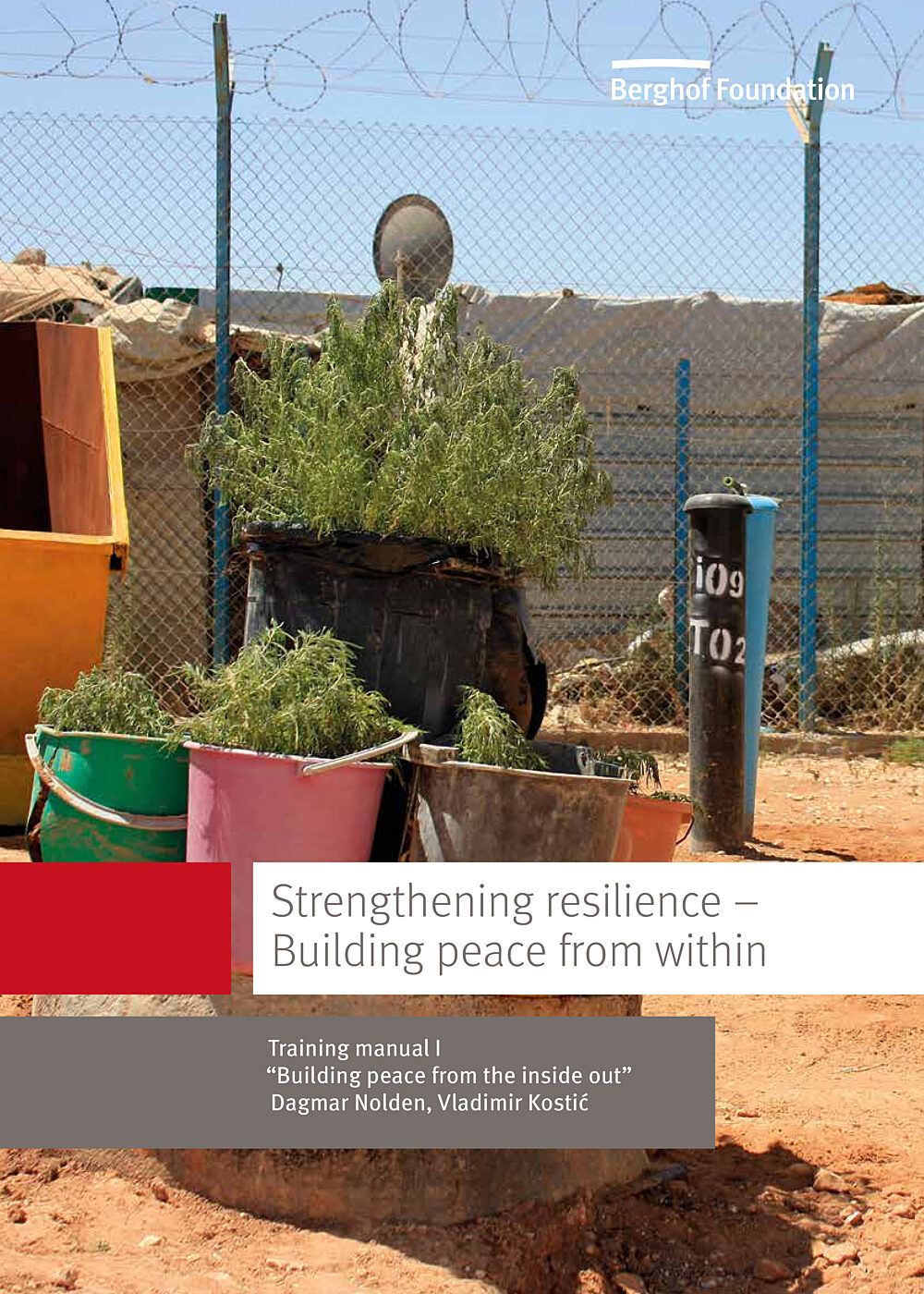
Strengthening Resilience - Building Peace from withinTraining manual I, Building peace from the inside out
This manual is published as part of the project "Nonviolent Education in Jordan". It gives an insight into the contents and methods of qualification courses which the Berghof Foundation implemented with Jordanian and Syrian (cash for work) staff members of international organisations in the refugee camps Azraq and Zaatari in 2017. The main focus of the publication is on mental and physical well-being and strengthening resilience. It contains advice for facilitators and descriptions of exercises for further use.
- Year2017
- Author(s)Dagmar Nolden, Vladimir Kostić
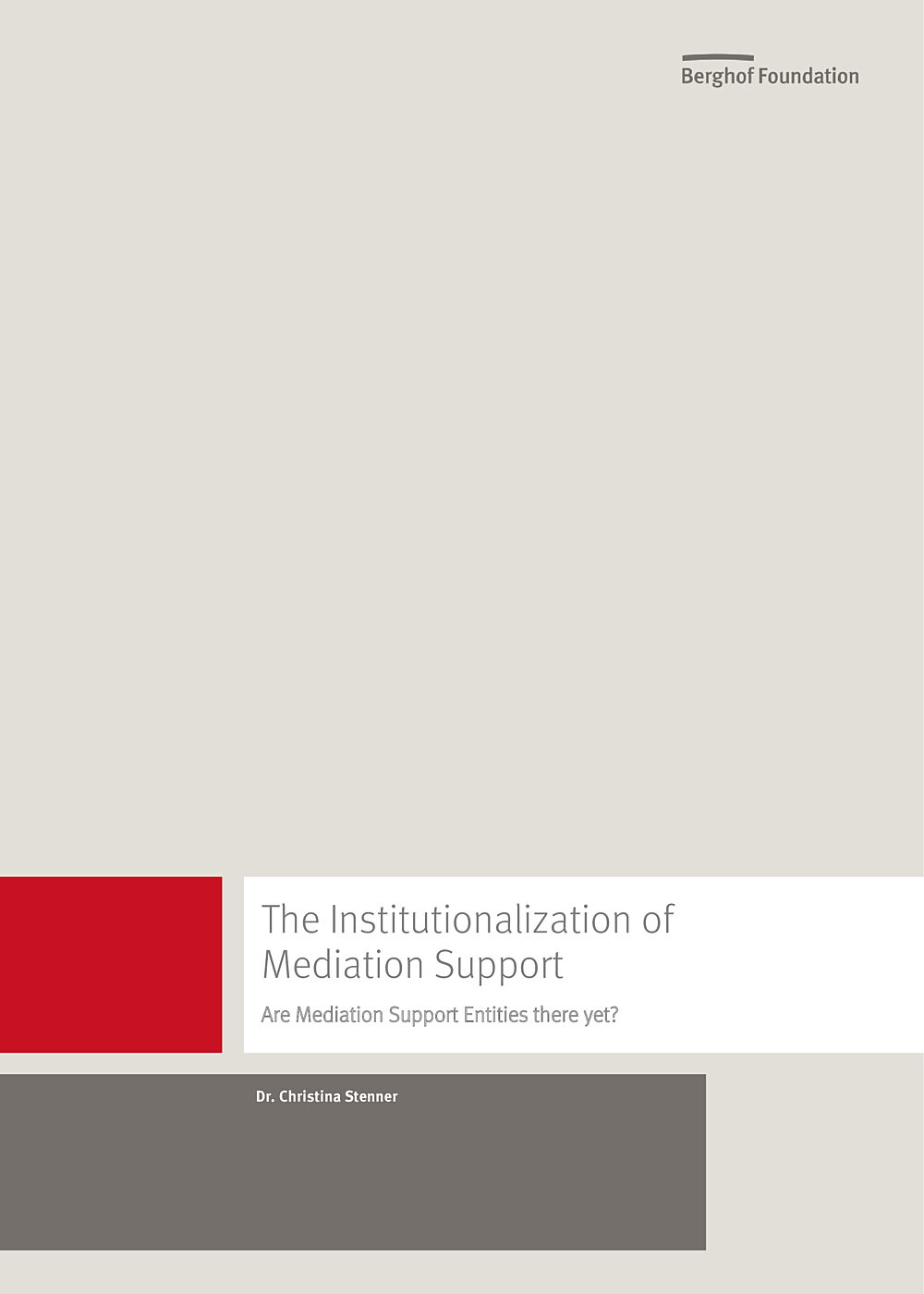
The Institutionalization of Mediation SupportAre Mediation Support Entities there yet?
This article’s objective is to give an overview and analysis of the emerging field of mediation support by looking at different portfolios of MSEs. It examines the actual significance and operationalization of MSEs in peace processes, and accordingly, its sufficiency for mediators. It also takes a closer look at MSEs’ self-perception. The article draws from qualitative interviews with mediation support staff between 2016 and 2017.
- Year2017
- Author(s)Christina Stenner

مدارس خالية من العنفيف األردن يف سبتمرب/أيلول 2017 املخيم الصيفي لوساطة األقران املنعقد
وساطة األقران هي املقاربة العامة لربنامج التعامل مع النزاعات دون استخدام العنف. يحتوي دليل املعلمني هذا والنظريات الرتبوية عىل مقدمة أساسية حول ّ »مدارس خالية من العنف!«، وهي تهدف إىل الحد من العنف يف املدارس وإىل تعزيز قدرات املعلمني والطلبة عىلمقاربة وساطة األقران وحول أساليب خاصة لعرضها عىل الطلبة ولتطبيقها يف املدارس. وهي ال تعترب برنامجا تدريبيا شامال للوسطاء األقران، ولكنها متنح بعض الوسائل املساعدة، مثل لعب األدوار والتامرين، التي تساعد عىل االستامع الفعال وعىل تغيري وجهة النظر وعىل التفكري النقدي، وهي جميعها قدرات بالغة األهمية بالنسبة للوسيط. ويتطلبّ ّ مكن من الحد من العنف بصفة دامئة وطويلةً ً ا وتحضري ً ا دقيقا. وللتالتطبيق، وخاصة تدريب الوسطاء األقران، وقتاألجل، ينبغي إرشاك املدرسة بأكملها يف عملية التطبيق، مبا يف ذلك قسم التسيري واإلدارة )انظر الفصل الخامس(.
- Year2017
- Author(s)Hazem Elgafari, Dagmar Nolden, Cassandra Schützko